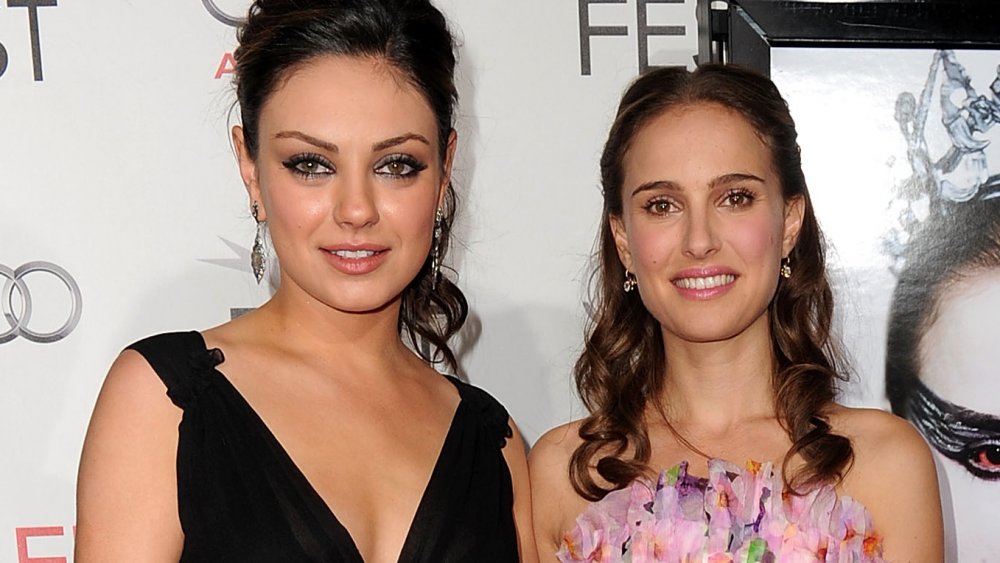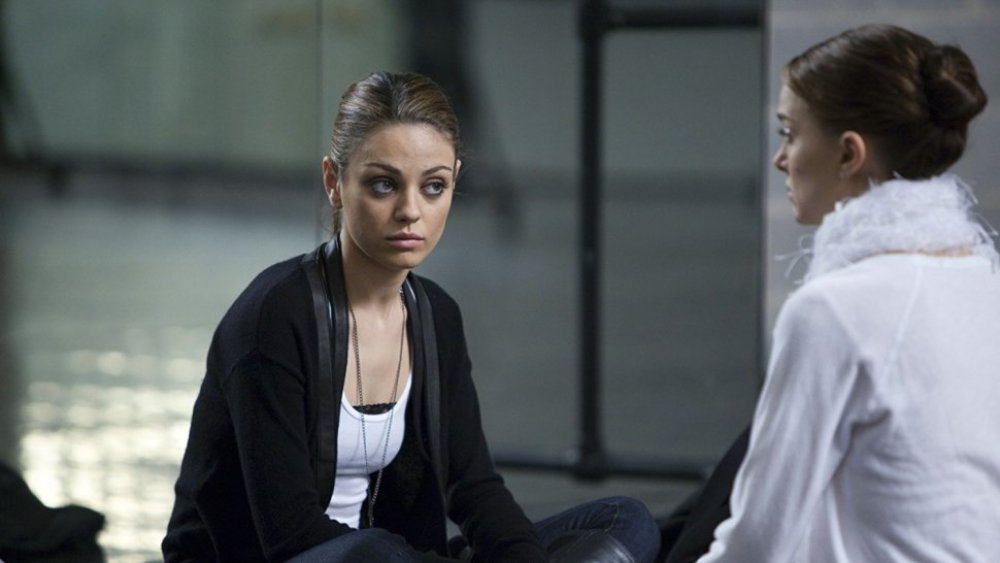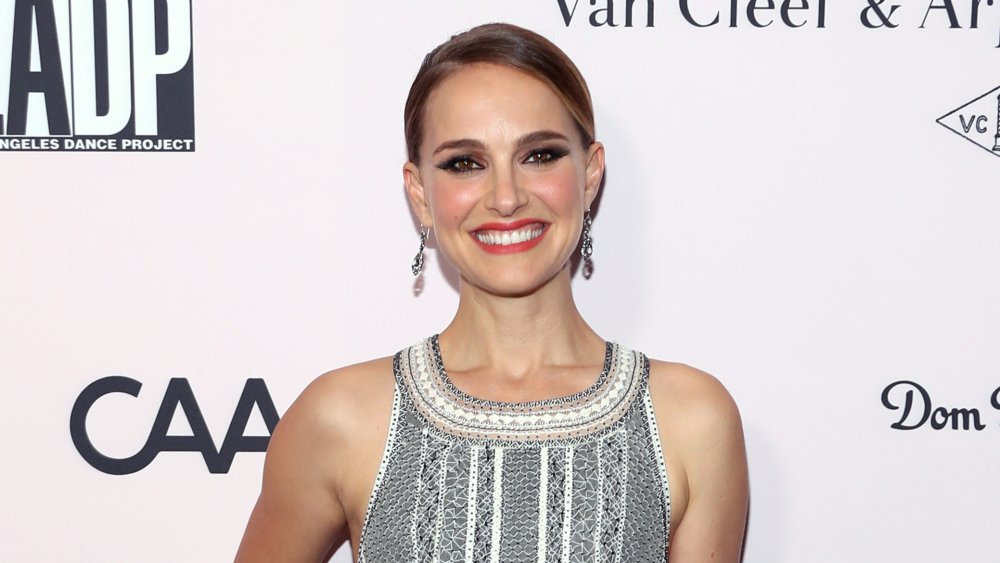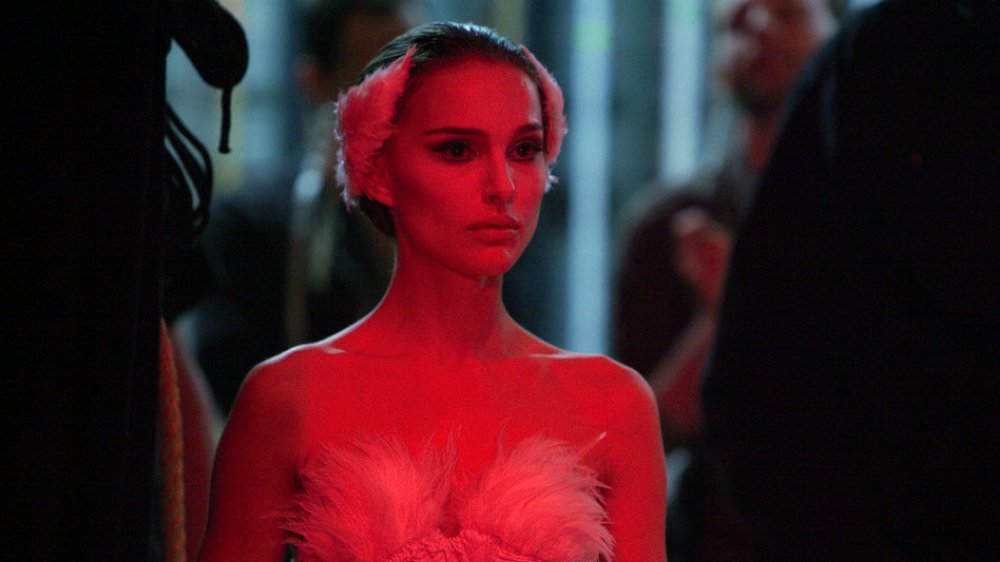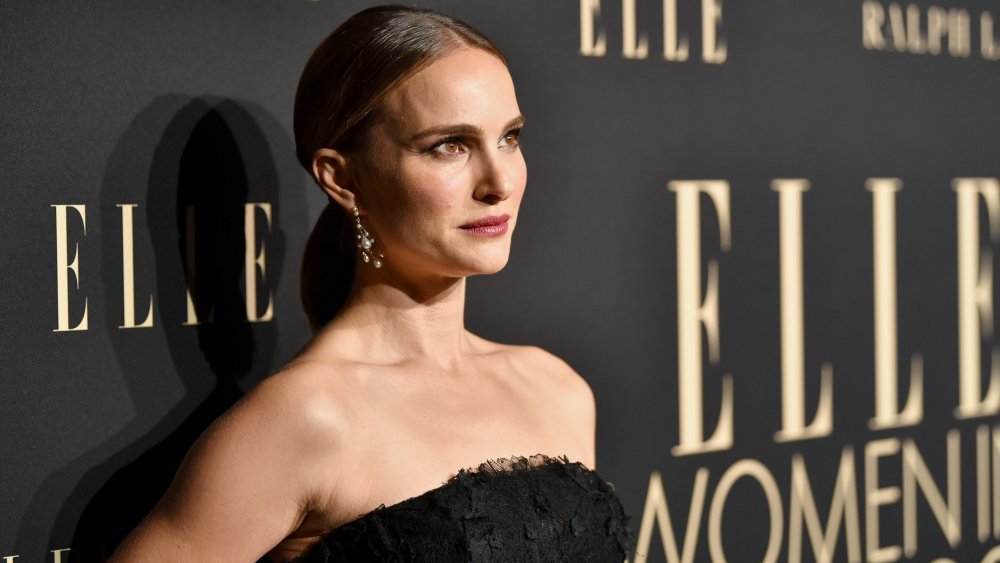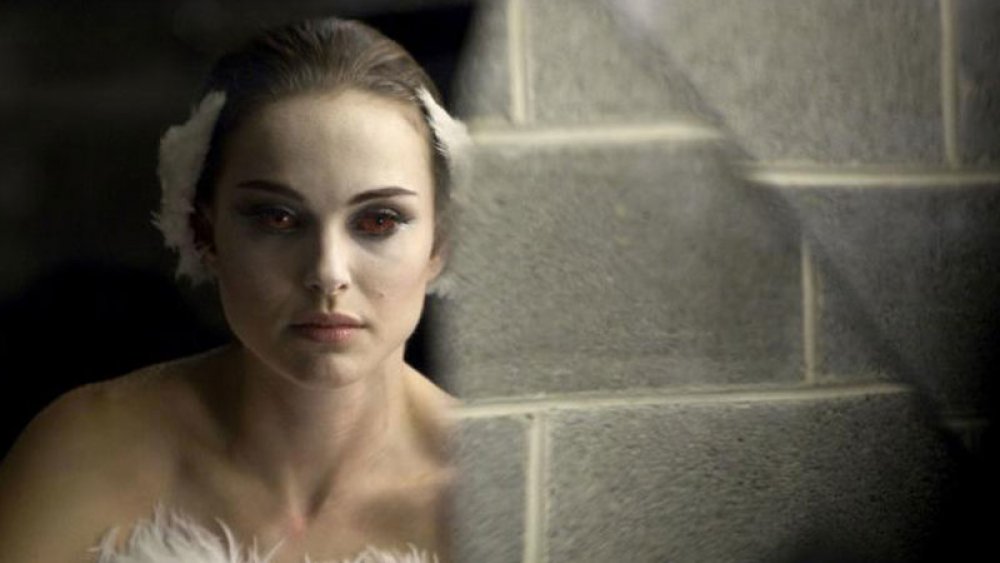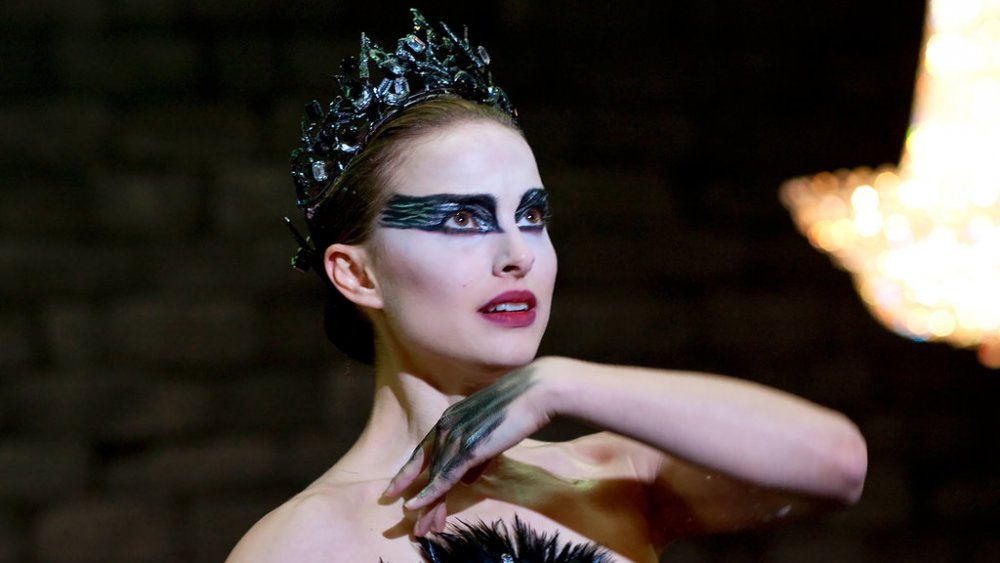Why Mila Kunis And Natalie Portman Were Never The Same After Black Swan
Black Swan isn't just a film about ballet. It's also about the unrealistic pressure that artists experience when they strive for perfection over everything else. In this grim and grisly tale, Natalie Portman plays Nina, who's aiming to be the star of the New York City Ballet Company's production of Swan Lake. She persuades the director to cast her as the lead, who must play both the innocent White Swan and the sultry Black Swan.
However, Nina ends up with some competition when Lily (Mila Kunis), a dancer with an uninhibited and carefree style, joins the company. And as Nina becomes consumed by her visions of perfection and her jealousy of Lily, she begins seeing illusions around every corner and loses touch with reality. The result is a psychological horror film that warns of the perils of chasing perfection.
Black Swan premiered to critical acclaim, with Portman winning an Academy Award for Best Actress. Years later, Kunis and Portman still look back at the film as a turning point in their careers, and honestly, neither actress has been quite the same since starring in Darren Aronofsky's artsy thriller. Here's why Black Swan made such an impact on both Kunis and Portman.
Mila Kunis found new respect for dancers
Before taking on the role of Lily in Black Swan, Mila Kunis had never really danced. It was a whole new experience for her, and she'll be the first to admit that she had no idea how hard ballerinas trained. She spent months working with choreographers to learn the ropes and get her technique down. After spending hours and hours in the studio, sticking to a strict diet, and pushing herself to her physical limits, she gained a high level of respect for dancers.
By the time filming wrapped for Black Swan, Kunis had a whole new perspective on the work that dancers put in and how ballerinas spend years chasing perfection. Hollywood is obviously competitive, but after working on Black Swan, Kunis felt that dancers had it harder. "I can't even put into words to you how competitive the ballet industry is," Kunis told Vogue, before adding, "They work their entire lives to try to achieve perfection that's inevitably impossible. And their career ends at 35, at best."
Natalie Portman lived out a childhood dream
Although Natalie Portman has been acting professionally since she landed her first major role in Leon: The Professional at 11 years old, she actually dreamed of being a dancer when she was young. Until she became a working actress, she was passionate about ballet and attended dance classes for several years. While playing Nina in Black Swan, she felt like she got to realize that childhood dream ... and she understood just how naive she was about the difficulties of being a ballerina.
"I always idealized it, as most young girls do, as the most beautiful art. It's an expression without words," Portman told She Knows. Portman went on to explain how delving into the world of ballet as an adult allowed her to see how difficult and cutthroat it really was. As she put it, "You don't drink, you don't go out with your friends, you don't have much food, and you are constantly putting your body through extreme pain."
Black Swan was Kunis' biggest challenge yet
Working on a film like Black Swan was an entirely new frontier for Kunis. She'd never played a character like Lily before, and although she embraced the opportunity to go out of her comfort zone, she also struggled at times. After all, her character was supposed to be carefree and naturally expressive while dancing, especially in comparison to Nina, who comes across as more uptight and careful. Lily made everything look easy, but for Kunis, it was harder than everything else she'd done as an actress. She had no idea what she was capable of until she played Lily.
"It was far from effortless or sensual," Kunis told Collider. "It was three months of training, seven days a week, four or five hours a day, before production started, and then during production it was pretty much exactly the same." She then added, "The physicality of this was probably the hardest of anything that I've ever done."
Black Swan built a stronger bond between friends
Before Black Swan, Kunis and Portman were already good friends. In fact, Portman first mentioned that she was training for Black Swan while the two were doing some shopping at a flea market. They were happy to have the chance to work together on such an intriguing film, but director Darren Aronofsky, who is notoriously tough to work for, wanted to raise the stakes. In order to make their on-screen competition look more realistic, he subtly tried to pit them against each other. For example, he would tell one actress that the other was working much harder on her choreography. However, Portman says that his strategy backfired.
"Darren would tell us things about each other to try to make us jealous. I think he was trying to create a rivalry in real life between us," Portman told US Weekly. But in the end, she felt that the experience only brought the two actresses closer as friends, and they didn't fall into a competitive trap.
It helped Portman become a new person
Portman doesn't shy away from admitting that she can be a bit of a people-pleaser. Over the years, she's tried to shift away from that mindset and gain the courage to say how she really feels, even if it means pushing back against the opinions of others. She's gained a reputation as a "good girl" in Hollywood, and although she knows there's more to her personality, she knows that there was some truth to this label. However, she felt that working with Aronofsky on Black Swan encouraged her to act for herself, rather than trying to impress other people.
"Having that apologetic, pleasing side to me — I've worked really hard to get out of that," Portman told the Los Angeles Times. She continued, "Darren learned one day that after trying everything he wanted to do, if on the last take he said, 'Do this one for yourself,' that's the one that would be my best."
Finishing the movie gave Kunis newfound freedom
In order to get into shape to play Lily, Mila Kunis has to lose weight. She was already quite thin, but if she wanted to convincingly play a ballet dancer, she needed to maintain a very strict diet and spend hours exercising each day. She took it very seriously, and while the thought of treating herself was always tempting, her only indulgence during this time was a root beer float on her birthday.
So after months of dieting and working out constantly, she was eager to enjoy her freedom again and relax. When the whole experience was over, she had a new appreciation for comfort food. "It took me five months to lose 20 pounds, and it took me hours to gain it back," Kunis told Collider. "It was magical, how quickly it all happened." Kunis said that after her final day of dancing, she immediately went home to eat a huge bowl of mac and cheese.
It helped Mila Kunis embrace imperfection
One of the major themes in Black Swan is the quest for artistic perfection — the desire to achieve it can be overwhelming and all-encompassing, but the actual goal always hangs just out of reach, because perfection itself isn't necessarily possible. In Black Swan, this drives Nina to have a psychological breakdown. And after playing Lily, Kunis realized that there was no point in holding herself to the standard of perfection. She's worked in Hollywood long enough to know that while Nina's story is fictional, there are plenty of people who desperately try to achieve perfection and end up losing themselves in the process. She believes that everyone will enjoy different things, and you can't please everybody.
"I'm not looking for perfection. I don't think it's achievable; I think it is impossible to achieve perfection," Kunis told The Talks. She continued, "What I consider beautiful, most likely you don't. That doesn't mean that I am right and you are wrong, it's just a difference of opinion."
It helped Natalie Portman explore human psychology
Natalie Portman is best-known for her acting career, but she's also book smart. She took time off from acting to study psychology at Harvard University, and she also spent six months studying abroad in Jerusalem. While she didn't end up pursuing a career in this field, she still values the time she spent in academia.
She rarely gets to apply this knowledge to her acting career, but every once in a while, her two passions align. She felt that her understanding of psychology helped her get into Nina's head. Nina is never diagnosed with any specific mental health conditions in the film, but Portman recognized her symptoms. "This was actually a case where something I learned in school did translate into something practical in life, which is very, very rare," Portman told She Knows. "It was absolutely a case of obsessive compulsive behavior. The scratching and the anorexia and bulimia are forms of OCD."
The movie revealed Portman's dark side
In Hollywood, Portman has always been known for having a good head on her shoulders. She isn't the type to pop up in the tabloids, she clearly values education, and she's always been poised and articulate. Portman is totally aware of the way she's perceived, and although she knows there's some truth to it, it's also become a running joke (for example, there's her tongue-in-cheek rap sketch on Saturday Night Live).
For Portman, Black Swan represented a chance to get outside of that box and challenge the public's perception of her. Nina is sheltered and innocent, and she struggles to embody the Black Swan, but Portman herself has no trouble portraying Nina's breakdown and her final, flawless performance. Her risque scenes with Kunis may have been a surprise to her fans, but Portman embraced the shock value. "Because it's me, people are shocked," Portman told Vogue. "I see the value of a good-girl persona — it's so easy to subvert it!"
Black Swan took Kunis to the next level
Kunis was already well known before Black Swan. She'd spent several years playing Jackie on That '70s Show, and she was also the voice of Meg Griffin on Family Guy. Additionally, she'd appeared in films like Forgetting Sarah Marshall. But it was Black Swan that established Kunis as a serious actress, one who could go beyond comedy. This role represented a transition to Kunis playing more mature characters.
While Kunis was happy about the success of Black Swan, she didn't realize the extent to which this role would change her life. She felt that she got to enjoy a certain level of privacy before Black Swan that she could never really return to. "I honestly thought, 'This is going to be a Darren Aronofsky movie. Maybe people will see it, maybe they won't,'" Kunis told Harper's Bazaar. She explained that before Black Swan, "I had anonymity. Right now, not nearly as much."
Portman's collaborative approach
Even when Natalie Portman trusts a director's overall vision for a film, she enjoys working with filmmakers who are willing to take the cast's opinions into account. While working on Black Swan, she got the opportunity to help craft the narrative of the film, and Aronofsky even trusted her with revising the conclusion. Portman demonstrated that she understood her character on a deeper level, and she got to leave her mark on the script.
"We had lots of conversations about the script. In fact, she helped completely change the ending of the film," Aronofsky told The Telegraph. "At one stage, it ended with Thomas [Vincent Cassel] calling her his little princess. But Natalie said, 'No, it's got to be about Nina achieving a major victory.'"
Portman appreciated the fact that Aronofsky actually valued her input. As she said, "I'm not exactly rebellious with directors, but I like to work with people who say, 'What do you think?' and are interested in the answer."
Black Swan left a lasting impact on Portman and Kunis
For both Natalie Portman and Mila Kunis, starring in Black Swan was an intense experience. From carefully watching their diets and training like professional ballerinas to exploring the unrealistic pressure artists can put on themselves, it wasn't the kind of film they could just walk away from without feeling like it had genuinely changed them.
Portman says that she likes to keep her professional and private life separate, and she makes it a point to leave work at work. But with Black Swan, that was more difficult. Out of all her roles, Portman has said that playing Nina in Black Swan "was definitely the most challenging and the most rewarding." Speaking with The List, she explained, "It's one of those things where I know it has affected me, but it's going to take some time to digest in what way." It was tough for Portman to let go of Nina. But while Black Swan illustrated the fact that perfection is an illusion, it's clear that Portman was the ideal choice for this role.
